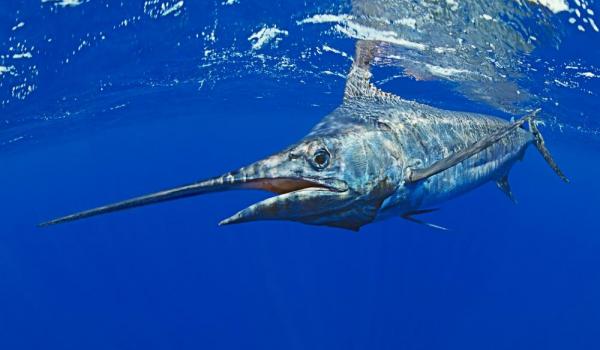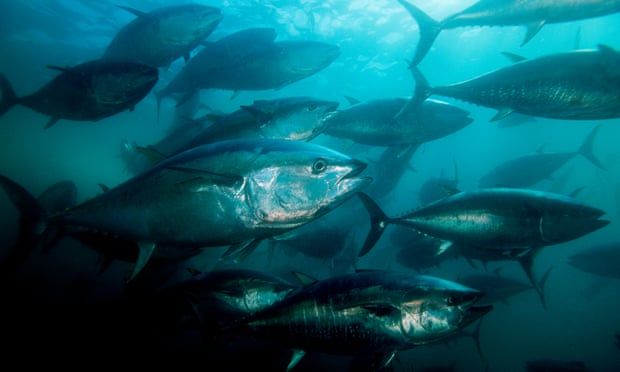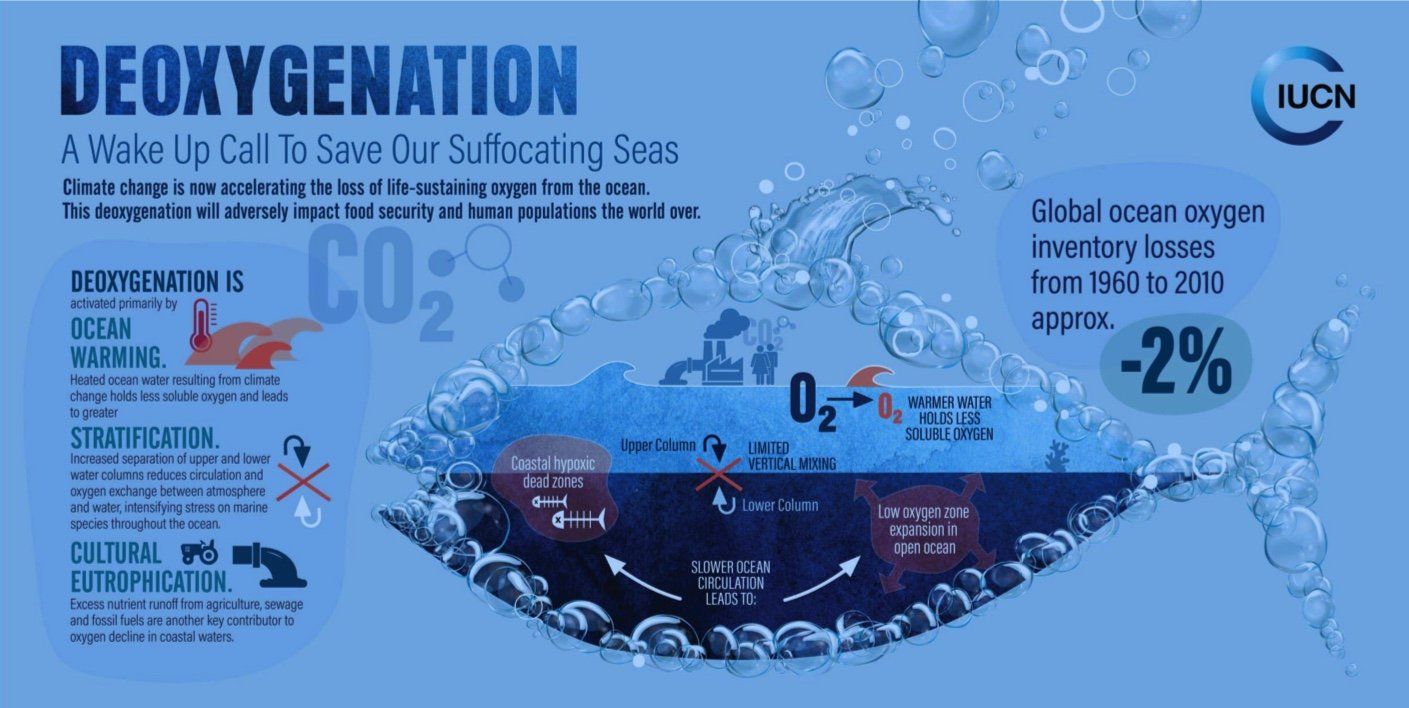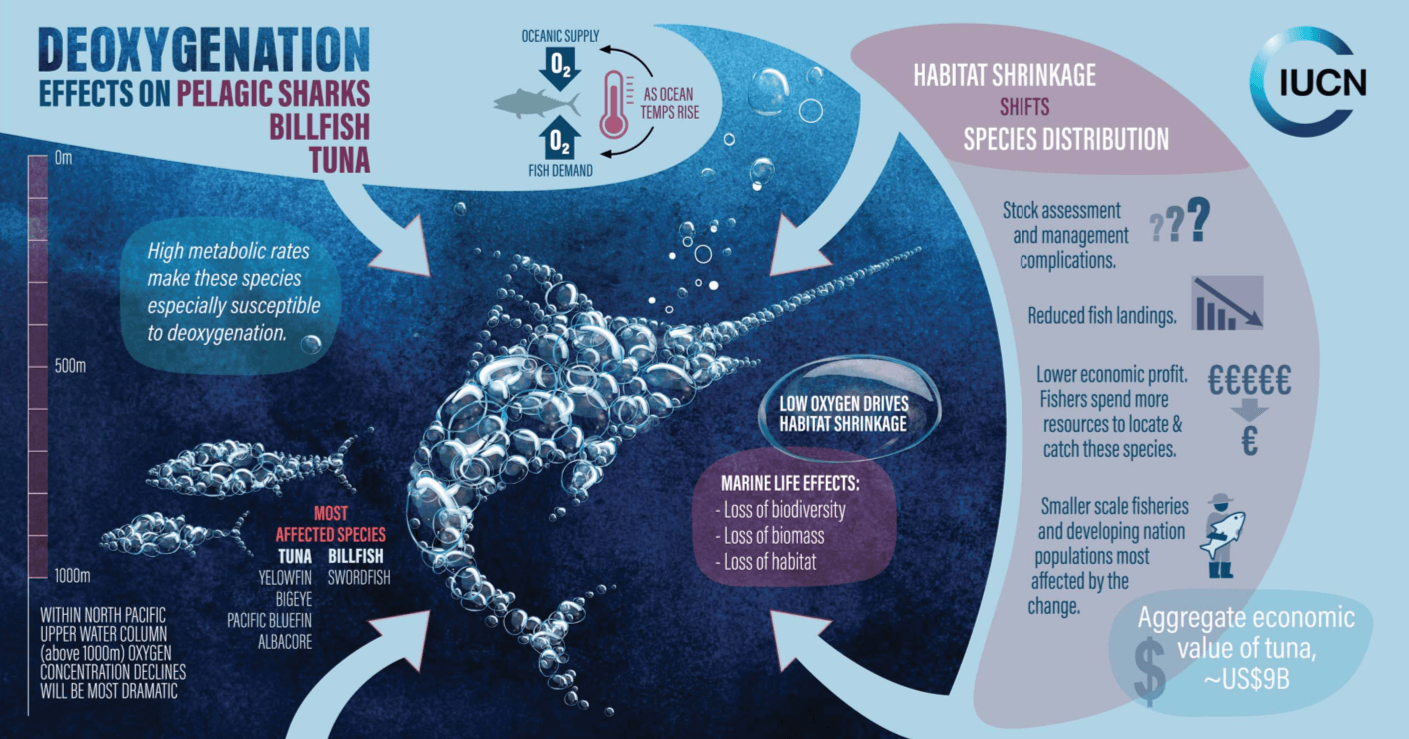Ocean De-oxygenation increasing at an alarming rate; Latest IUCN Report!
According to the International Union for the Conservation of Nature (IUCN), the oceans are loosing oxygen at an unprecedented rate, putting populations of large fishes such as marlin, tunas and sharks at risk from the spread of "dead zones".
De-oxygenation of the oceans is one of the most prolific, yet under reported human included consequence of the climate crises and intensive agriculture. Large fishes such as tunas, marlin and sharks are at risk in these areas with effectively no oxygen present. Since research began in in the 1960's areas with dangerously low levels of oxygen have increased from 45 to 700. The findings from the research were presented by the IUCN at the UN Climate Conference in Madrid on the 6th of December 2019.
Acting director general of the IUCN, Grethel Aguilar, said " the health of the oceans should be a key consideration for the talks. “As the warming ocean loses oxygen, the delicate balance of marine life is thrown into disarray. The potentially dire effects on fisheries and vulnerable coastal communities mean that the decisions made at the conference are even more crucial .”
All fish require dissolved oxygen, however, the biggest species are particularly vulnerable to depleted oxygen levels because they need much more to survive. Evidence shows that depleted levels are forcing them to move towards the surface and to shallow areas of sea, where they are more vulnerable to fisheries exploitation.
Some ocean areas are naturally lower in oxygen than others, but these are even more susceptible to damage when their oxygen levels are depleted further. Species that can more easily tolerate low oxygen levels, e.g. jellyfish, some squid and marine microbes, can thrive at the expense of fish, upsetting the balance of marine ecosystems. The natural oceanic cycles of phosphorus and nitrogen may also be a risk.
The world’s oceans are already being overexploited and are fished beyond scientific recommendations, plastic pollution is at an all time high, as well as other pollutants. Seas are about 26% more acidic than in pre-industrial times because of absorbing the excess carbon dioxide in the atmosphere, according to the Intergovernmental Panel on Climate Change.
Low oxygen levels are also associated with global warming, because the warmer water holds less oxygen and the heating causes stratification, so there is less of the vital mixing of oxygen-rich and oxygen-poor layers. Global oceanic oxygen levels have decreased more than 2% in the last 50 years (1960 - 2010). We are expected to lose about 3-4% of ocean oxygen by the end of this century, but the impact will be much greater in the levels closest to the surface, where many species are concentrated, and in the mid to high latitudes.
Intensive farming also plays a major role. When excess artificial fertiliser from crops, or manure from the meat industry, runs off the land and into rivers and seas, it feeds algae which bloom and then cause oxygen depletion as they decompose.
The issue of ocean dead zones are not new, but little has been done to address it. Farmers rarely bear the brunt of the damage, which mainly affects fishing fleets and coastal areas. For example, the meat industry in the US was found to be responsible for a massive dead zone measuring more than 8,000 sq miles in the Gulf of Mexico.
This year’s UN climate conference, known as COP25, highlighted how vital the seas are in protecting us from climate chaos – as they absorb so much of the excess carbon dioxide, and excess heat, in the atmosphere – and how much they are at risk from its impacts.
Protecting marine life could help the oceans to function better, soaking up more carbon and providing barriers against sea level rises and storm surges, in the form of coral reefs and mangrove swamps.
According to the IUCN; " Oxygen decline will impact marine ecosystems and the dependent human population. Even the smallest fall in oxygen levels, when near already existing thresholds, can create significant issues with far-reaching and complex biological and biogeochemical implications."
"At a global-scale, warming-induced oxygen loss is driving progressive persistent changes in nutrient cycling and recycling, species distributions, marine ecosystem services and habitat availability. Whereas at a regional scale, the formation of low oxygen zones and harmful algal blooms become more frequent."
© Ocean Research & Conservation Ireland (ORCireland) and www.orcireland.ie , est. 2017. If you like our blogs on the latest news in marine science and would like to support our work, visit www.orcireland.ie to become a member, to volunteer or to make a donation today.
Reference:
https://portals.iucn.org/library/node/48892
SHARE THIS ARTICLE

















